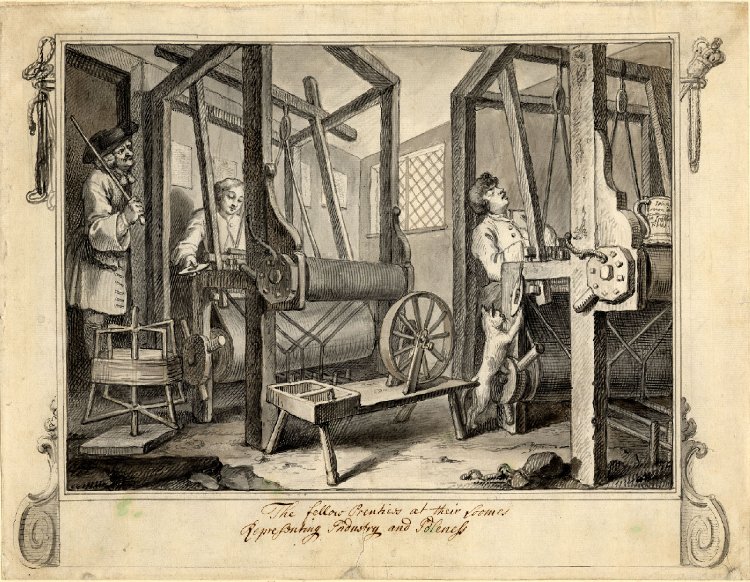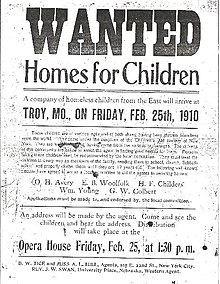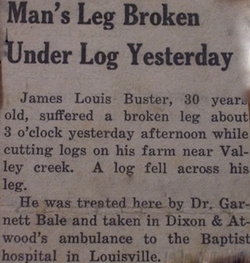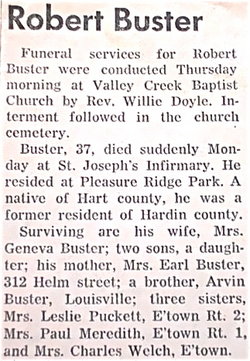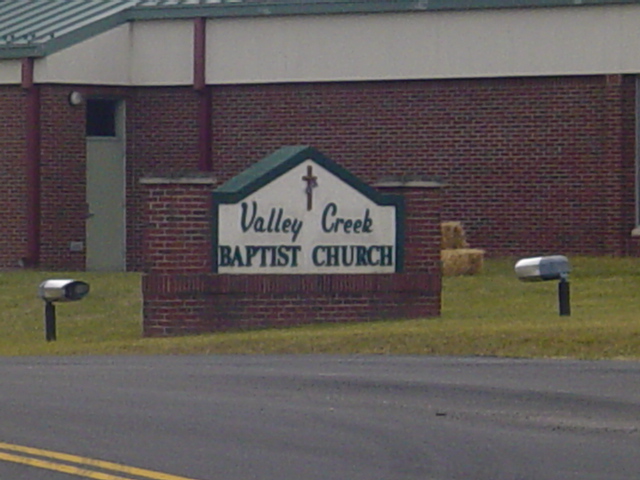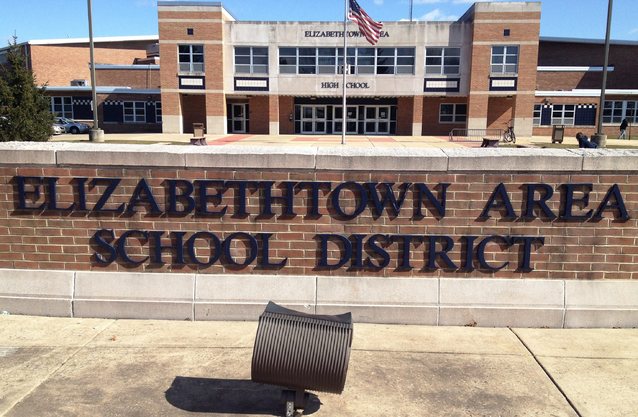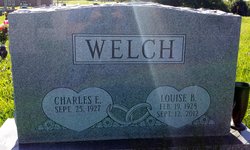by Sharon Kay Welch Blankenship
*Earl Dee Buster was the grandson of John Milton Buster who was indentured, or "bound out" when he was 6 years old in 1844, two years after his father's death. To learn more about "binding out" for children of the Buster children, read here.
When I first began thinking of writing about the Buster family I realized I look at them almost as an oddity, the family was almost too good to be true. They seemed to always get along; they all loved each other, and the strangest of all they showed it. In my family, my brothers and I showed expressions of love by who could take the hardest hit in the arm, without crying. This memory brings a tear to my eyes.
 |
| Photo of sharecroppers |
https://www.findagrave.com/memorial/82281836/earl-d.-buster
The Buster’s were very poor, the father Earl Dee Buster was a sharecropper, so the family always had a place to live. I remember mom telling about how her mother would make glue and glue newspaper to the wall, this served many functions, it helped keep out the cold drafts in the winter, it was cheaper than paint, and she said that if you got bored you could always sit and read the wall. The family raised all kinds of animals, chickens, pigs, cows, ducks and geese. My grandmother would take eggs to the market and sell them. They always had a large garden and canned almost everything. I remember mom telling me that her mother could make large pans of fresh sausage, make it into patties, fry them and then can them for later use. They didn’t have electricity, or indoor plumbing. In the summer food had to be kept in a springhouse, it was much cooler there and food could be kept longer. The family always had enough to eat, it may have just been beans and cornbread, but there was always enough. Mom said that every once in awhile she would get to take a special lunch to school, salmon patties on biscuit, again in the summer months the children would take their lunch pails to the creek and weigh them down with a big rock to keep everything cool, until lunch, Oh how we all take refrigeration for granted.
The family grew up in church; it was their entertainment, their way of socializing, with lots of dinners on the ground following services. But most of all it was also their way of life, their strength to get through the rough times to come, and rough times would come to the Buster family.
Earl Dee Buster was born on Feb. 4th, 1897 in Adair County Ky. His parents were Allen Buster and Annie Virginia Elizabeth Tinsley. Earl was only two days old when his mother died of complications of childbirth. He was later sent to live with his aunt and uncle, the Rev Thomas Tinsley and his wife Kitty G. Tinsley. This was not uncommon in those days, many families lived on farms and without the mother to care for the children……well we all know how that usually turns out.
At the ripe old age of seventeen Earl married Hessie Taylor Pitcock who was almost over the hill herself at age fifteen. I tease, but in those days kids grew up fast, children had most of the skills and knowledge needed to run a household, and farm. They were married on Sept. 23rd, 1914 by the Rev. Tinsley. I truly admire my family, my grandfather managed to raise a good honest, hardworking family on very little if any formal education. Just to be able to survive the season’s, droughts, sickness and hard times, and be able to get by is more than just admirable.

As I mentioned earlier, Earl was a sharecropper most of his life, so that meant that the family lived on several different farms mostly in and around Hardin County Ky. He was finally able to buy his own farm in 1941. I think it was located in Rineyville, KY I have heard many times that Earl was a very tender hearted person and enjoyed his family a great deal. Once there was a Halloween party and most of the children were going, and they begged my grandmother and grandfather to go with them. They declined saying it was for the children in the community. Earl was tall and slim, and my grandmother who was short and plump, each dressed up as the opposite sex, and showed up at the party unannounced. It took quite a while for everyone to figure out who the tall lady with the short squat man really were. In those days, people would have “pound parties”; everyone would bring a pound of their favorite party food.
Earl who was known as daddy by his children had a kind and giving heart, even if it wasn’t his to give. My mother told me that one time when she was little she became ill, and her father promised that if she got better that he’d give her the big white goose, the only problem was that it was her mother’s goose. He loved to go to auctions that must be where I get it from. HE came home from an auction one time with an organ in the back of his truck; my grandmother evidently became pretty upset because he spent money on such a thing. He told her it was pretty and it would look nice in the living room, it didn’t matter to him that no one in the family knew how to play it. Anytime my mom or anyone in the family would recall that story her family would get so tickled and just laugh and laugh.

Mom was the baby of the family and she apparently had her father wrapped around her little finger. When it was time to kill chickens for supper, mom would say, “Oh daddy I just can’t”, he’d make one of the older girls to do it instead. Annie and Hazel held a grudge for quite some time over this injustice. Mom said that the only time that she ever remembered her father getting irritated with her was when they were striping tobacco and tying it into bundles to get it ready for market. She said it was such dirty, dusty work that she couldn’t stand to do it. So she got creative and tied her bundle up using a tobacco leaf to tie a pretty bow, when she showed her father he told her to just go to the house. I’ve seen pictures of my grandfather and he looked like he’d had a hard life. But he was a wonderful man, and I wish I had been able to know him. Family members say that my brother Mike looks like him.
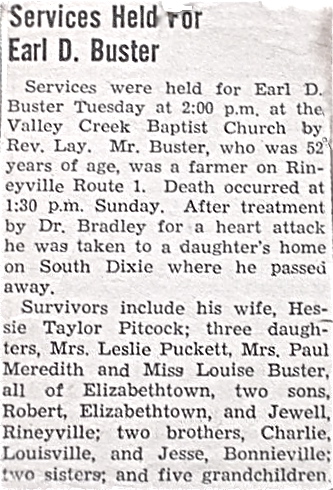
Earl Dee Buster died on June 26th, 1949, he and my grandmother were on their way to celebrate Hessies’ birthday when he began having chest pain, they were able to make it to their daughter Annie’s house where he died there of a massive heart attack. At the time Annie and her husband Leslie lived at 1674 Sportsman’s Lake Road. That house is just down the road from where I live, I pass it often and I always think of him and my grandmother and what it must have been like for them on that day. I never got to meet him and I always hated that, he sounded like a wonderful man. My mother said, he loved to sing and he had a beautiful voice.
Hessie Taylor Pitcock was born on June 27th, 1899 in Allen County Ky. Her father’s name was William Louis Pitcock, and her mother was Rebecca Shockley. I always thought the names of the girls of the family were………ah……..different. They were Hessie, Essie, Bessie, and Effie. Can you imagine the parents in the heat of an argument, trying to keep the names straight? Hessie! Bessie! Messie, I mean, Essie! I don’t remember hearing much about her childhood, but many of the family are buried in Scottsville, Ky. That’s where Essie lived, I went to see her with my mom, Annie and Hazel once for what the family called Decoration Day, (Memorial Day).Essie took one look at me, and said, “Oh you’re a big stout girl.”It’s what every girl hopes to grow up and hear one day. That’s me big and stout, I felt as though I was about to be shipped off to market.
Hessie and Earl married very young and had six children. James Louis (Louis), Robert Douglas (Jack), Arvin Jewell (Jewell), Rebecca Annie (Annie), Carrie Hazel (Hazel), and my mom Mildred Louise (Louise). And no I don’t know why they all went by their middle names, except Jack, and his name wasn’t even Jack.
 |
| 1950's seamtress |
I remember my grandmother well, everyone called her Ma, and she was pure Americana, she wore her hair up in a bun and wire rimmed glasses, she made almost all her own clothes. She was an excellent seamstress, who loved paisley prints, so many of her dresses and aprons were made of paisley prints. And in case you didn’t know, no woman worth her salt made a dress and not a matching apron. Heaven help you if you invited company over for dinner after church, and you didn’t have an apron that matched your dress. Ma was an excellent gardener, and cook. Mom told me that when she was young, that Ma would tell her to look through the Sears and Roebuck catalog and find a dress she liked, and Ma would lay out brown paper and sketch out the pattern fit it to mom and proceed to make a dress to match the catalog. Animal feed used to come in cloth bags, and the women would use those to make quilts and clothing.
I used to spend the night with Ma every so often, and in her living room were two portraits, one of her mother or grandmother and one of a baby. The story was that the baby was dead when the picture was taken, I never believed it, but my brother’s never failed to tell me that right before they went home, leaving me there to think about that all night. They would tell me that the eyes of the old woman in the other portrait would follow you around the room. I tried not to make eye contact with that one. Ma lived on Helm Street in Elizabethtown, Ky. Her last residence was 333 Helm St., the home is no longer there it was torn down and another home moved in its place.
Ma was so much fun, she loved to play games, checkers, Chinese checkers, and her favorite was the card game Rook. It was so funny because if she got the Rook she didn’t have much of a poker face and she would smile or giggle. Everyone would say, “Ma’s got the Rook”! She always had cookies that she kept in a big round tin, in her kitchen and she almost always had fudge stripped cookies, the round one with the hole in the middle. Leave it to the big stout girl to remember where the cookies were. Ma was a Christian and always tried to go to church. She was always piecing a quilt or crocheting something. I loved to go there to visit, she had a party line phone, and when she was outside in the yard, or taking a bath, I used to listen to the ladies in the neighborhood talking to each other. On a party line everyone shared a phone line, but each person had a different ring. One ring was for one person, two rings for someone else, and so on. I learned a lot.
Ma was plump and that made for the softest lap in the world. I’ve slept many a sermon with my head on her lap. It’s why I cuss today. Ma had this little giggle that was very contagious, we had so much fun with her; I was only twelve when she died, and naturally at that age I didn’t realize how permanent it was. To never see how long her hair really was again (past her waist, and very thin) to never be able to ask about quilt patterns, and the old days. I’ve grown up to enjoy a lot of the same things that she enjoyed, and I think often how I would love to be able to talk with her one more time, To see her smile when she was holding the Rook. To lay my head in her lap and sleep, while she fanned me with one of those old fans with the funeral home advertisement on it.
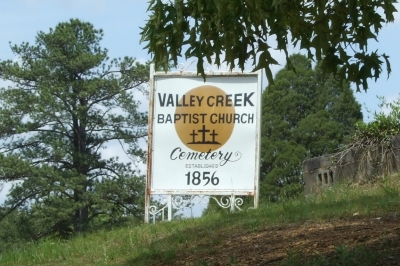
Ma suffered on and off with diverticulitis for many years, she had colostomy years before her death, she died on Jan. 27th, 1972 of diverticulitis, she died during surgery. Her funeral was on such a cold, horrible day there was a layer of ice on everything. She was buried next to her husband Earl Dee at Valley Creek Baptist Church Cemetery in Elizabethtown; their graves are very near the parking lot on the upper end. Many other family members are buried there too.
_______________________________________________________________
Rebecca Annie Buster, Puckett better known to all of us as Annie. My dear aunt Annie. I have to tell you, I loved all of my mother’s family and was very close to many of them, but Annie and her husband, my uncle Leslie were two of the best people I’ve ever known. They were true Christians in every sense of the word. Annie was born on Aug. 23rd 1915 in Allen County Ky., she was the first born for Earl Dee and Hessie. She often spoke of helping with the other children as they grew up. She evidently had a lot of responsibility as child, and she worked hard all her life.
 |
| Puckett Rd |
Annie married Leslie Puckett on Dec. 1 1933, and as far as I know he farmed all his life. I think they lived in several different places and farmed for others, for many years before getting their own farm on what was eventually named for them Puckett Road .It was your typical two story farm house with a porch swing and huge shade trees in the front yard and an absolutely worthless pear tree in the back yard. That thing would just hang full of pears nearly every year but they were always hard as rocks. Oh well, they were fun to feed to the hogs. I wish I could express the love I had for that farm. I love animals and it was heaven on earth to me. I can see Leslie now laying back on his lounger on the screened in porch with his hat down over his eyes, dozing after a huge dinner(that’s lunch for us city folk),before he would return to work till dark. He’d push his hat way back to where you could see his white forehead that had been shielded from the sun. He’d point to one of the barns and tell me to go see what was new. I’d run like crazy because I knew that meant a new baby pig, pup, calf or kitten. I loved Leslie so much; he was such a sweet man. He used to call me baby.
After Annie and Leslie married in Larue County Ky. They settled down to a life of hard work and heartaches. Not just the usual, rough times that goes along with farming, but with trying to have a family as well. On July 27th 1935 on what should have been a joyous occasion, Maxie Puckett was born and died the same day. I’m not sure if it was as a result of a stillborn birth or not. But on Nov. 4th, 1936 they were blessed with a healthy son Charles and then again on Jan 13, 1942 when Jerry was born. Two boys, everything was going well for the family, but tragedy would strike again, this time twice as hard. On June 5th, 1946 Annie gave birth to twins John and Joan, they both died shortly after delivery as I understand. Every Memorial Day we put flowers on those little graves along with the rest of the family. I can’t help wondering what they would have been like had they lived.

Annie was a force to be reckoned with; she had a huge garden every year and canned dozens and dozens of jars of everything from tomatoes, beans and even blue pickles. I’m sorry, I’m sure they were delicious, just like everything else she cooked but I just didn’t trust a blue pickle. She could pull a cast iron muffin pan full of cornbread out of the oven with one hand. Mom was always impressed by that feat. She made huge dinners for the farm hands every day, and many times on Sunday would have the preacher and his wife or visiting preachers for dinner after church. She kept house, at one time they had chickens and sold eggs, she too was an excellent seamstress and an avid quilter. She was known for her famous fried apple pies (my brother Steve would have given me away to the gypsies for one of those fried pies.)Her cornbread was to die for, and oh my gosh her fried chicken……insane.
Once an insurance salesman showed up at supper time, and that was usually the smallest meal of the day for them. Annie and Leslie had just sat down to eat, and instead of sending him of his way, Leslie invited him in to eat I’m sure Annie could have just beaten him right then and there because they only had two pork chops and left over veggies. They went on to share what they had with him, each giving him half of their already cut up pork chop , it was at this point in the story that mom and Haze would clutch their chests and scream, YOU HAD ALREADY CUT UP YOUR MEAT AND HE SAT DOWN AND ATE WHAT YOU HAD ON YOUR PLATES!!!!!!!!! You would have thought this man was an alien from Mars or something. I couldn’t help thinking of the salesman when he told the story to his wife and she clutching her chest screaming, YOU ATE THE MEAT OFF THEIR PLATE, WHAT’S WRONG WITH YOU!!!!!! That poor guy, I bet he thought long and hard before accepting another invitation. But that was who Annie and Leslie were they were so sweet and generous.

I have such great memories of family reunions, on the farm. Leslie would pull a hay wagon around under the tree’s everyone would bring out bowl, after bowl and huge platters of food. We would all sit under the big shade trees out front and talk and laugh and I’d listen to the stories being told. All my aunts and uncles would be there, cousins running everywhere it was a perfect day for a kid.
After things slowed down on the farm as Annie and Leslie got a little older Annie decided to get a job in town. She took a job at the Goodwill in downtown E-town. Once Annie had to work and she had corn that needed to be “put up”, so my mother, Hazel, my cousin Yvonne and I came to the rescue. We froze corn for hours I have yet to see that much corn in one place since that day. Mom and Haze had picked it, and Yvonne and I shucked and silked it. We froze more corn that day than Green Giant. Mom was getting so tired cutting the corn off the cob, and was complaining about her hands when Yvonne mentioned that she would love to help, but her mother (Alma) would never allow her to because she was afraid she might cut herself. That was music to mom’s ears she quickly handed her the knife saying “Just be real careful”. Yvonne and I still talk about that day, and all that corn.
 |
| tractor from the 1970's |
Leslie began having health problems and had a heart attack which ultimately led to the sale of the farm. That was one of saddest day I can remember for our family. I never will forget driving down the lane to the house and seeing all of Leslie’s tractors and farm machinery all lined up in a row ready to sell to the highest bidder. When we got to the house the furniture was in the front yard and a crowd was gathering, Mom had already started to cry and told me to go on in so that she could compose herself. We all wanted to be strong for Leslie, but in the end he was the rock for us. It was horrible to see; bit by bit their whole lives being whittled down and sold off piece by piece. Leslie did real well, I was amazed, I thought it was going to be alright, but then they started selling the livestock, it became too much for him. He went inside to be alone for a while. So many people think that farmers don’t care about their animals, that they are just to be fattened and sold. But not this farmer, not Leslie Puckett.
I thought this will be too much for them, this is all they’ve ever known, and how will they ever adjust, to an all new way of life. Boy was I wrong. It didn’t take long at all for Annie she loved her new home on Bardstown Road in E’town, it is directly in front of Lincoln Trail Elementary School. It was a sprawling brick home with a two car garage and basement, a first for Annie. It was a beautiful home. Annie used to say they were like the Beverly hillbillies. I remember when she showed Mom and I her central vacuuming system. We were all like the Clampett’s, we oohed and awed, it was hysterical.
Leslie did adjust; he liked his recliner a lot. It was good to see him relax for a change. But his health began to betray him his heart finally gave out on Aug.11th 1980. He was buried at Valley Creek Cemetery, near Maxie, John and Joan. He was an absolutely wonderful man, and I miss him greatly. Annie was shaken to her core by Leslie’s death, and it took her a long time for her to get back on her feet and be able to carry on. Her faith got her through the lonely times. She began going on vacations something that as a farmer’s wife was almost impossible. She went on a cruise, and would visit her children and their families for days. She went on many trips, even camping with Haze, Paul, mom and I. She had spent all her life working on a farm, but now was the time to enjoy life and she did.
Annie was quiet but very funny, she could tell the best stories .But boy she had a competitive side too. I didn’t play partners in Rook with her, it was too much pressure. I always played partners with my aunt Haze, neither one of us cared if we won or not, we just liked being together. Don’t get me wrong Annie liked being together too she just liked it better if she was holding a winning hand. Many nights were spent at her kitchen table playing cards; we would sometimes laugh so hard that we would cry. I loved going to her house, but when we would just sit and talk I always got so sleepy. I wasn’t bored at all; it was just that she made you feel so welcomed and relaxed. That funny little giggle of hers, and her simple sweet smile.
Annie began having light strokes, she had someone living with her and helping, but her health kept deteriorating, she eventually had to go to a nursing home. My mom often spoke of Annie’s strength about having to live there. She quickly made new friends; she was the life of the party at her lunch table. All the nurses and aides loved her. I remember visiting her often, I worked at the ambulance service and my station was less than a mile away. Whenever we would take a patient back to her facility, we would stop and see her. My husband was also my partner at work. Every time we would walk into her room she would say in a high pitched “Oh, there’s my little ole niece”. I went to see her on New Year’s Day 2000, I asked her if she knew what year it was, she was trying to figure it out when I told her it was the year 2000. She looked at me as though I’d celebrated the New Year a little too much. She said she never thought she’d live to see that day. I guess she really didn’t her headstone had to be redone it already had 19__ on the death year and not 20__.
My mom and my aunts were all very strong female role models for me. They would thank my mom for having me. We spent so much time together and I have so many wonderful memories. I will never forget my little ole aunt…..Annie.
_______________________________________________________________
 |
| Bernheim Arboretum |
Carrie Hazel Buster Meredith was known as Haze to all of us. She was one of my favorite people on earth, but how do I describe Haze, hmmmm let me see, how can I say this, she was crazy. But crazy in the best way, she was so much fun, so unpredictable and was always up for anything. I always loved Haze, she was about five foot three or four, had auburn colored hair, and wore glasses. She also carried a purse that never weighed less than five pounds, it always had tissues, her lucky rabbits foot, a pocket knife, finger nail clipper, a sewing kit and once while on a hike enough moon pies for six people. Haze seemed to know every bird, she called herself a “bird brain” She knew both species of the bird, where the nested, what they ate, and she knew many species by sound. She could grow anything. She had such a green thumb. She loved to go to Bernheim Arboretum where she would collect seeds from different trees and shrubs, which by the way is strictly forbidden, but she said that was just silly that they were just going to run over them with a lawnmower anyway.
Hazel also inherited the seamstress gene, something that apparently skipped me. Mom would tell how Haze and Ma (my grandmother) could look through catalogs and make dresses just like the picture in the book. She quilted, crocheted, cross stitched, reupholstered her furniture with a pedal Singer sewing machine and even made Christmas ornaments. She too was a wonderful cook, her corn, oh my her corn…….there are no words to describe it. She made the best potato , tuna, and pimento cheese salad. She could make a cobbler out of anything, we camped together a lot and she would find a wild apple, cherry, or mulberry tree and we knew that cobbler would be for dessert that night. At one time the government would give out free five pound bricks of cheese to senior citizens, she laughed about us staying in a Holiday Inn once on a trip and eating pimento cheese from the government.
 |
| Beech Bend Park |
Hazel seemed to be so interested in everything , she was so knowledgeable about so many things. She was willing to help with any questions , I had on cooking, canning or gardening. Mom, Haze and my brothers and I would go camping together. Once at Beech Bend Park we were to leave the next morning and it came a torrential rain. The worst thing to do when camping is pack up your gear wet. But we had no choice, so everyone was soaking wet and muddy . But the picture in my head of mom and Haze in there pj’s and shower caps to keep their hair dry, is something I hope I never forget. We camped all over Kentucky, my uncle Paul would sometimes go too, some of my fondest memories are of those camping trips.
I had been working on this little book of mine for a while but when it was time to write about Haze I found myself postponing sitting down to write, so far it has been the hardest to write, not that Haze wasn’t an Interesting person, or that I couldn’t think of enough to say, but I couldn’t stand to sit down and write about her in the past tense, I try not to think of Haze as being gone forever, it’s too hard for me. Haze was my second mom, and Paul my second father. Many children wonder what would happen to them if they lost both parents, I never did because I always knew that Haze and Paul would take me and raise me as their own. Haze was the kind of crazy aunt that every child wants. Crazy in the best way.
She shared one of her first memories with us once, about the birth of my mother Louise. Haze told that Annie had to take her to a nearby farm house to stay for awhile and it was a heavy snow on the ground. She said it was the middle of February and too cold for her to be out, and she didn’t know why my mom couldn’t have waited to come some other day. Hazel was a wonderful big sister despite this though, my mom loved her dearly, and we were all devastated when she left us.
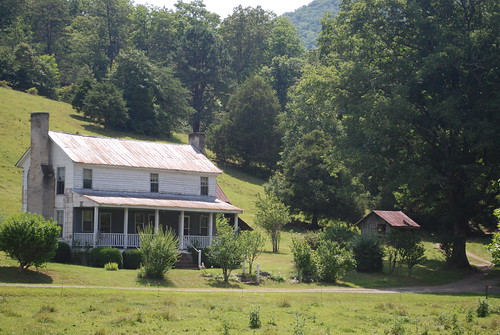 |
| Sample of KY farmhouse |
Hazel married Paul Meredith and they had one child, a daughter named (and she is going to kill me) Judy Sue Meredith. She has since married and changed her name to Meredith Kelly. I sometimes feel like I’m in a family of mobsters with all the name changes in the family, but I digress. Meredith was with us on many of our illegal escapades. We trespassed on Mom and Haze’s old farmhouse site, so we had to pull up a post and move a chain to get the car back out, who cares. That was the time it was so terribly hot that they all took off their shirts and walked around in their bras. My Lord I thought we were all going to hell that day. Like I said Haze had a true green thumb and her yard on Holman Ave. in E-town was full of stolen……I mean acquired plants that we had gotten all over the place. There were the Mammoth Cave daffodils (that’s federal property) The Bernheim Forest Oak tree. The My Old Ky. Home money plant and on and on and on.
Did I mention she was part witch doctor too? Haze worked for my father (Charlie Welch) at the Dairy Chef, she cooked and kept the place lively. My oldest brother Steve came to work one day and made the mistake of telling Haze that a wart had appeared on his hand. Haze took a chicken gizzard, (they didn’t sell as well as the livers) and placed the gizzard on the wart, spoke a couple of strange things and waved her hand over his, then she took the gizzard and threw it down the garbage disposal. Steven laughed and walked off. In less than a week the wart was gone. I can just imagine someone reading this who never knew Haze.
She was so funny, once we were at Pine Mountain State Park and my brother David had walked in his sleep the night before and left the door of the cabin open. The next night Haze sprinkled flour all over the floor, so we could see if it really was Dave or an intruder, so before she got up we all walked in the flour to confuse her. We were camping once and a raccoon came up and stole the marshmallows right away from Haze and ran into the woods, she told us to be quite and said she could hear them sitting around the campfire roasting our marshmallows and laughing. When hiking we would stop to rest, and she would find these little holes in the dirt, and she would say “doodle bug, doodle bug, come on out”. Never in all those years did I ever see the doodle bug. She loved to play aggravation, Rook, Chinese checkers, and crazy eights. She swung on grape vines with my brothers, she climbed trees. She just loved life. I could go on and on.
Hazel had a car accident in October of 1998 and never left the hospital. She had broken several ribs and got several different infections and died in December. Carrie Hazel Buster born August 9th, 1919 and died December 9th, 1998. I will never forget the impact she made on my life.
_______________________________________________________________
Arvin Jewell Buster was born on August ,23rd 1924 My uncle Jewell was just that a jewell. He was a big man, tall and stocky; he was mostly bald with a little band of hair that went around his head. His voice was deep and came from the back of his throat. He had the most contagious laugh in the world.
My mother idolized her big brother; he was her favorite brother, and her best friend growing up. He would often play with her, when the others were hard at work. Mom used to tell a story about she and Jewell were told to pick the corn worms off the corn in the garden. They picked them and put them in a coffee can and when they were finished they lit a fire and cooked them. I found the story disgusting but she thought it was cool. She said that he would play dress up with her and would entertain her for hours on end.
Jewell farmed with his dad for years, he joined the Navy, and married Alma Gertrude Wurst on February,16 1949, my father said that when he returned from the Navy that he continued farming for a while. Later in life he became a plumber by trade, he was very knowledgeable about his profession.
 |
| 1950's Louisville, KY |
Alma and Jewell lived in a small house in Louisville that was filled with children and love. They had three children, Jewell Thomas (Tommy) on Sept. 20th 1950, Daryl Wayne (Daryl) Oct. 12th 1955, and Wanda Yvonne (Yvonne) July 2nd 1962. I used to love to go to their house to visit, they were the most welcoming family I knew. We always had fun together. My family had three boys and me, and they had two boys and one girl, we were very close in ages with Jewell’s kids, so we always had someone to play with.
I used to envy how much they loved each other and showed it. It was so different from my family. They would hug each other hello and goodbye, my brothers would look on in horror, afraid that my mom would one day make us do that. I tease about it but it really was very sweet. It was such a nice laid back place to visit, Alma was such a sweet person and always wanted us to stay a little longer.
Jewell always had a joke at the ready. I don’t know where he got all of them, but they were always funny. He would tell a joke and then somewhere deep, deep down in his belly this laugh would start coming, he laughed in kind of waves. Almost like you would imagine Santa Claus would laugh.
I don’t know when Jewell’s health began to fail him but he started to have a lot of problems. He was a heavy smoker and emphysema plagued him for years. Then like his father, he began having heart problems too. I think he had several heart attacks, and work just wasn’t possible. He began having a lot of shortness of breath with the slightest activity. I look back on that time and wonder how he stayed so cheerful. As the head of the household, with children and a wife depending on him, how that must have been so hard on him, and yet he was so happy. It was like he didn’t want to burden anyone with his problems.
Daryl worked at a landfill as a heavy equipment operator and would bring Jewell old lawnmowers or shovels, rakes and hoes that needed repair. Jewell would fix them and sell them. Alma always had a beautiful quilt going, which she would sell and she quilted for others as well. They made it, and quite nicely I might add. As a child I never knew the financial issues they must have had, because it was such a fun, loveing home. They were so proud of their family and rightfully so. Tommy was so sweet, always with a ready smile and lots of interesting stories. He was slim with that dark hair and eyes, handsome. Daryl the big teddy bear, was like Jewell, a big man with a big laugh. Daryl was so easy going and make friends easily. He loved to just sit and listen to the family’s stories and laugh. Yvonne was three years younger than I and the apple of her daddy’s eye. He would just light up when she came into the room. He was so proud of her and she was daddy’s girI ,I remember her sitting on his lap with her head on his shoulder, I was so jealous but happy for her at the same time.
I always hated that Jewell’s family lived In Louisville, for me it seemed like a state away. We didn’t get to visit as much as we would have liked. But when we did get together it was always fun. It’s just insane to think that Jewell, Alma , Tommy, and Daryl have all passed away. It just doesn’t seem possible that I’ll never hear that hearty laugh or hear anymore jokes as only he could tell. That I won’t hear Alma’s southern drawl or see her loving eyes. I won’t see Tommy’s dimple when he smiled or the way he talked king of out of the side of his mouth because he was always smiling. That I’ll never be with Daryl and his sweet spirit.
My cousin Yvonne is an amazing lady, and I have told her often how I admire her. Her strength and faith are incredible. The way she just keeps going after having such adversities to deal with, is truly inspirational. She is just like her mom; she keeps in touch with everyone, and is always there with an encouraging word. When I talk to her it’s like I’m back in their living room, she is sweet like Daryl, always smiling and has a dimple like Tommy, always laughing like her daddy and she has her momma’s eyes. Our family misses your family.
_______________________________________________________________
James Louis Buster was born on May 17th 1917 I’m sorry to say that I know very little
about Louis. What I do know is that he had many health problems in his short life. Mom said that he was a very good person, and that he was kind and soft hearted like his father. He apparently had some type of seizure disorder which limited him greatly. She told me several times about an accident that Louis had, while he was helping his father log some land. He apparently had a seizure while riding a horse or mule, and fell causing the log to roll over his leg, breaking it badly. He was seen by the local Dr. and transferred to Baptist Hospital in Louisville. When he returned home he never fully recovered. Mom said he was always hindered by that accident.
In my records I’ve found where he married a woman named Geneva Metcalf, but I have never heard this myself. I think it was some information that Yvonne sent me, and I’m not sure where she found it. But he never had children.
I hope to find out more about him one day. I wish I could have known him. He sounded very sweet. Louis died on December, 2nd 1941 and he too is buried at Valley Creek Cemetery in E-town near his mom and dad.
_______________________________________________________________
Robert Douglas Buster (Jack) as he was known to everyone was born on May 9th 1922. I don’t know much about my uncle Jack. He seemed to be a handsome man by looking at his pictures. He married Virginia Meredith who was Paul Meredith’s sister, (keep up with me here) Paul was married to my aunt Hazel Buster. I’m just glad I don’t have to map out the Meredith and Buster family trees, whew talk about confusing. Anyway…… he was married to Virginia who I heard was a real sweetheart, and they had two children together Phil and Pat.
Remember earlier I said I sometime feel like I have family from the mob because everyone changed their names or went by another name later in life, well here goes. Turns out Pat’s name isn’t even Pat. It’s Priscilla, but now she goes by Ann. When I started on Facebook a person named Ann McDaniel wanted to be my friend, so being confused I called on old reliable, Yvonne to clear things up. I asked if we were “kin” to an Ann McDaniel’s and just to mess with me she told me yes it’s Pat, of Phil and Pat.
Are you shaking your head now? Let me recap. Robert Douglas AKA (Jack) was married to Virginia Meredith who was a sister to Paul who married Hazel . Virginia and Jack had Phil, and Pat AKA Priscilla AKA Ann McDaniel . And Haze and Paul’s daughter Judy is now Meredith Kelly. Whew!
Let’s see where was I, Jack divorced Virginia, and later married Geneva Buckingham and they also had two children Johnny and Robin. Johnny was always so quiet but took everything in at the family get togethers. He has an easy going personality and a funny little laugh. I was always very fond of him. His sister Robin is the spitting image of her momma, dimples and all. I hear she is living in Kansas now; I would love to reconnect with them.
I didn’t see much of Phil and Pat growing up, but my family was very fond of them, and asked about them often. I’m very thankful for Facebook for helping me find long lost family. It turned out that Pat’s son lived in my neighborhood while stationed at Fort Knox and she had come and visited him. She was less than a quarter of a mile away and we didn’t know it. It truly is a small world.
Jack was in the Army in World War 2 , and he too died of a heart attack on July 6th, 1959. I was less than a month old when he died so I never knew him either. I wish I knew some interesting stories about him, but I don’t. But I do know that he had some really sweet children.
_______________________________________________________________
Mildred Louise Buster was born on February 19th, 1928, and was the last member of the Earl Dee Buster family. Earl and Hessie’s baby girl would grow up to be my mom. Born in Larue County, mom went to school at several one room schools, Rineyville and Howevalley. She would be the first in her family to graduate high school, something she was very proud of and thankful for. She received a watch from her parents and that and her class ring were always two of her prized possessions.
Mom loved her family so much and was always proud of them. Never was she embarrassed that she couldn’t buy the nice dresses that she saw in the stores. Or that her clothes were made of feed sacks. She was amazed that her parents always managed to provide for them and one thing that was always in great supply in their home was love. Mom adored her family. The death of her father shook her and the rest of the family hard, and she spoke lovingly of him many, many times over the years.
Religion was always very important to my mom. She joined Valley Creek Baptist Church at age twelve,and is the oldest living member to this date. Mom went on to raise her children in church, I don’t think she thought it make much of an impression on us, but it did and I am forever thankful for this.
Before she was married she worked as a clerk in the Hardin County Courthouse and while she was employed there she lived with Annie and Leslie in the house on Sportsman’s Lake Road, (old Dixie Highway) it was the same home where her father had died.
My mom was just meant to be a mother, she was a natural. My oldest brother Steven Charles was born on December 19th, 1951, he was spoiled rotten, and I think there must have been a billon pictures taken of him. Oh look he’s looking to the left, isn’t that cute quick get the camera.
Michael Glen Welch came into the world on June 8th, 1953 and as the second child all the pictures of Mike could fit into a wallet.
David Keith Welch (the golden boy) was hatched on May 28th, 1955. David never did anything wrong in his life and was the pride and joy of my mother, but……I’m not bitter. Really though David did lead a charmed life, lots of friends, popular, good in sports, good grades, tall, handsome, and boy scout. I’m getting nauseous. Mom and Dad didn’t have to take pictures of Dave; his picture was always in the paper. Don’t get me wrong, I love him; it was just a tough act to follow.
After three boys my mother must have prayed and prayed for a beautiful, sweet little baby girl. A little princess to dress up in pink frilly dresses, fix her hair, and pick out the latest fashions. Unfortunately she got me. Sharon Kay Welch born on June 29th, 1959, mom used to call me her morning glory because I was born early in the morning. She never once acted disappointed that I was a tomboy, that I hated to wear dresses, and TIGHTS (who on earth came up with those things) when I’d wear them the crotch would always be at my knees. Try playing kick ball like that. As for childhood pictures….I think I broke the camera.
 |
| Sample 1960's hairstyle |
Mom got up every morning, and while having her morning coffee she would fix her hair and makeup. In the sixties and seventies ladies would tease their hair to the size of a bushel basket and use a half a can of hairspray on it. Mom would never go to town without looking her best. Ladies would wear dresses and heels downtown to by towels and underwear. It was nice that people took pride in their appearance and everyone spoke to others and smiled. I wish things could be like that again. Not the dresses and heels part.
I don’t know how mom did it, I can’t imagine having four children to get up, dressed, fed, off to school, homework sports, piano lessons, and scout meetings etc.etc. Our clothes were always clean; we were on time, our projects finished, cupcakes delivered, and all without missing a beat. Mom was the disciplinarian, our soft shoulder to cry on, our confidant, she was everything we needed when we were growing up.
I remember the drama that always went on at school, and crying when I didn’t have a boyfriend when all my friends did. She told me that there wasn’t anything wrong with me, it was that I just had higher standards than my friends, It worked I stopped crying. She always had a way to make all of us feel special. Everyday there were arguments (and that is putting it mildly) among us kids. Everyday. The only time we got along was during the Andy Griffith Show. Poor mom, only a half an hour of peace, a day.
My dad never wanted to go on vacation with us much, I can’t imagine why. Don’t get me wrong we went to Florida a few times, but it was nonstop so we could make “good time”. It didn’t matter that we were killing each other in the back seat, or that we were starving, or that mom and almost ended up with permanent bladder damage, we make “good time”. So mom and my aunt Haze decided we would all start going camping. Dad didn’t go; he said he had enough of sleeping on the ground in the Army. (We slept on cots)Sometime my cousin Meredith would go and my uncle Paul.
Some of my fondest memories were our camping trips, we went to almost every state park in Kentucky, and we camped or stayed in the cabins. It was an inexpensive, vacation and for some reason we got along most of the time. There was only one problem, I used to get terribly car sick. We loved our camping trips, fishing, horseback riding, miniature golf, hiking, campfires. The boys would play golf and we’d swim in the lakes. It was some of the best times of our lives.
Mom and I had a lot in common, we were both the babies in our families and we both had great mothers to look up to. Mom taught me to be strong and to always stand up for what is right. I remember being so embarrassed when she would stand up to a teacher that she didn’t feel was treating one of her children right. Or when she would pick up trash on her walks and carry it until she got to a trash can. Now I find that I do the same things. I got so involved in my youngest stepson’s education that his father and I homeschooled him for three years.
I find myself saying the things that mom used to say when we were growing up, and oh my Lord, I grunt now every time I get up or sit down. Mom was everything to for us; she loved her kids with everything she had. Family was everything to her. It was so hard on her when she lost her mother, I was twelve when Ma died and it devastated my mom. If it hadn’t been for Annie and Haze being there for her to talk to I don’t know what would have happened. She cried for months every time she would think of her. Being the youngest my mom had to live through the deaths of her entire family one by one. But nothing would prepare her for what would come on day. The death of one of her children.
Mom came to every piano recital I had, every school open house. She went to every baseball game, every scouting event, and every teacher conference. She is an amazing woman and my greatest role model. Mom and I were very, very close. My dad worked a lot and mom was alone, so instead of letting it get her down, we would do something together. We could be up and packed and on the road within an hour, and did so quite often. We both enjoyed auctions and for years we would map out sales on the weekends to go to. We enjoyed antiques and historical places. Mom was my best friend.
1973 was a very hard year for mom. My brothers Steven and Michael both married and David graduated and went to college at Eastern Ky. University. I saw my mother just sitting and crying at times just lost that her family had gone from six to three in a blink of an eye. Mom gradually came out of her depression, she had worked outside the home off and on as we got older, and this helped her make it day to day. She worked at clothing stores and a fabric shop.
In 1974 mom’s first grandchild was born. Chad Michael Welch came into the world on June 2nd, and made our lives so happy. Mom couldn’t wait to hold him when they came over; she loved when he spent the night. Mom was back in full force; she had a grandbaby and loved every minute. Many more grandchildren were to follow. Each with a special place in her heart. My brother Michael and his wife Chiquita had two sons, Chad Michael, and Jeffrey Glenn. My brother Steven and his wife Karen had two sons, Brian Steven and Benjamin Charles. And my brother David and his wife Starla had two sons Quinton Davis, and Cameron Mitchell. I married Michael Blankenship and I have two stepson’s Roger Glenn and Jesse Tyler. That’s right I’m the only original Welch girl. Two great grandchildren have now been added. Chad and his wife Becky have, (yeah, you guessed it), two sweet little boys. Dylan Michael and Donovan Wayne. Our family has been very blessed.
The years that followed were unbelievably hard on our family. So many deaths, we practically lived in funeral homes. Paul died on April Fools Day in 1998, six months later Haze died. In June of 1999 my brother Steven died from a sudden heart attack, I was the one who told mom that he was dead. I can still here her screaming, “Not my baby, not my Steve”, It was the worst day for our family. Steven was always there for all of us. If your car got stuck in the snow you called Steve. If the basement flooded you called Steve. If you needed to remember any family facts you called Steve. Always with a ready smile and a helping hand.
Steve loved family get togethers. He loved history , especially the Civil War. He and my brother Mike would go metal detecting together for relics. He loved his boys Brian and Ben and was a very good dad. He and Mike built out House. My brothers built several homes in their spare time, they also built mantels, and furniture too. They were so close and Steve’s death was especially hard on Mike.
Three months after Steven’s death his ex wife Karen died of complications of cancer. Steve’s youngest boy Ben was only eighteen when he lost both parents. One of the last things Steve did was watch Ben graduate from Elizabethtown High School. He was just beaming and grinning from ear to ear. Mom never did get over Steve’s death, I don’t think that’s possible for a mother.
I married on November 16th 1994, and unfortunately mom didn’t approve of my husband. I don’t think she could get used to the thought of not having me there all the time. We were so close, and the thought of being without any of her children was too hard for her to bear. This was the hardest thing I ever went through with mom, second only to Steve’s death. It simply broke my heart that she couldn’t accept him into the family. The two people I loved most in this world, and it just didn’t work, it was a horrible experience. I know that every family goes through hard times; there are illnesses, deaths, marriages divorces, and disagreements in every family. It’s how you come out in the end that matters most.
Mom began having problems with her memory, I took her to have her tested, it was early dementia. Dad took care of her for quite some time, but the disease was advancing. Michael (my hubby) suggested she come live with us. I’m so blessed to have such a forgiving husband. I remember the day I explained it to mom and she agreed it would be best. I had been blessed to be able to retire just two weeks before she started getting much worse. Mom came to live with us in August of 2007.
It’s so hard living with someone who has Alzheimer’s, she looks like mom, she sounds like her, and her laugh is the same. But she asks for Ma and daddy, Haze and Annie. She sometime looks at me and knows who I am, but most of the time she doesn’t recognize me. At times she just laughs and laughs and we all get tickled and laugh too, not having any idea what is so funny, but if she’s happy, I’m happy. I’ve said this before, I still have my mother with me, but oh how I miss my mom.
My mother is the last of Earl and Hessie’s family, but the Buster name lives on. We all have a little bit of Buster in us.
The reason I wrote this little book was to write down the memories that I have, and share some stories that I remember. I wanted the family members who didn’t know our relatives to be able to get a little glimpse of what they were like.
I write like I talk, I love to laugh and joke like Jewell and Steve and Haze. And I hope and pray that nothing that I’ve written offends anyone. I didn’t plan this and didn’t take notes, I just put pen to paper. Some dates may be wrong and there’s tons that I know I’ve left out but I hope you can get a feeling about what it meant to be a Buster.
If you have stories to share, I’d love to hear them and maybe we could add on some more chapters.
_______________________________________________________________
Earl D. Buster's Family Tree
father: Allen Morton Buster (1864-1938) KY
gdad: John Milton Buster (1838-1875) KY- one of the 5 indentured children
ggdad: Charles Woods Buster (1794-1841) KY/VA
2ngdad: David Buster (1766-1806) NC/VA
3rd gdad William Buster (1729-1795)
4th gdad William Buster/Bustard (??-1749)




_(14759557101).jpg)


